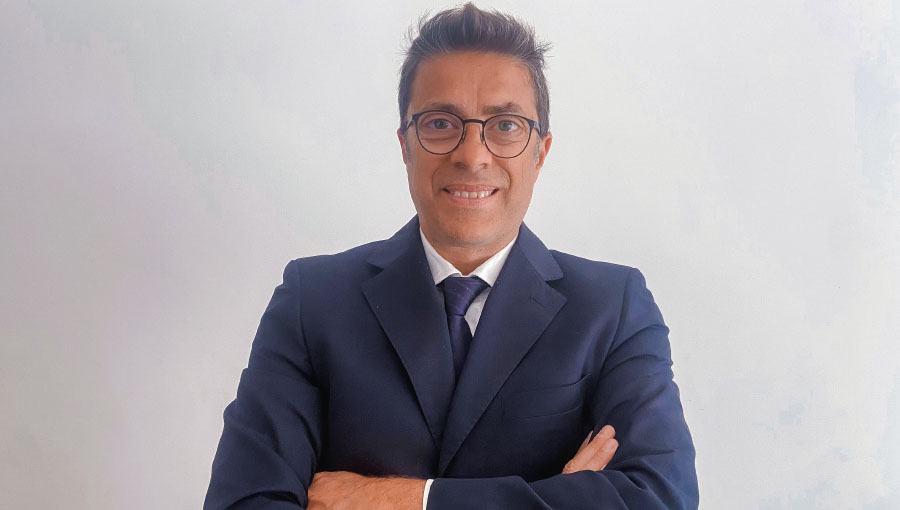A Look at the Big Picture: Mathematics Professor Stefano Arnone
Stefano Arnone is Associate Professor of Mathematics at John Cabot University. He holds a Laurea cum laude as well as a Dottorato di Ricerca in Physics from the University of Rome “La Sapienza.” He was a Postdoctoral Research Fellow at the SHEP Theory Group, the University of Southampton, UK from 2000 to 2003, and an Assegnista di Ricerca (Research Fellow) at “La Sapienza” from 2003 to 2007. Prof. Arnone’s main research area is Quantum Field Theory, the language in which all of modern physics is formulated. He was voted JCU Professor of the Year for 2017.

Professor Stefano Arnone
What brought you to Rome and John Cabot?
Studying mathematics has always been my answer to the what-would-you-like-to-do-when-you-grow-up question. In eleventh grade, I met an incredible Physics teacher who instilled in me the passion for the subject: after that my answer changed to studying physics! And that is what I did: I obtained my laurea and Dottorato degrees from the University of Rome “La Sapienza” and, then, went on to spend four years as a post-doctoral research fellow at the University of Southampton, in the UK. When I came back to Rome, my hometown, I discovered that the promise of a full-time position at ”La Sapienza” could not be kept, and so I began to look around for alternatives; that is when I discovered John Cabot University!
With so many liberal arts colleges in the US, why should one choose JCU?
I believe that John Cabot be the perfect blend of liberal arts education and Rome. In other words, a contamination of the American tradition with the Eternal City and its historical and cultural heritage.
What is it like to teach math at a Liberal Arts College?
When I started, I did think of that as a problem. I could not see myself teaching intro classes in algebra and statistics forever, or even for a few years. However, over the years, I changed my mind. I now find the conveying of a concept, however easy or difficult it might be, to be very rewarding, and I like teaching introductory courses as much as advanced, almost master-level courses, like the one that I introduced four years ago in Mathematical Statistics.
Tell us about your teaching philosophy.
Engaging students in the learning process is the key to helping them achieve the course’s learning objectives. Whenever possible, I try and avoid what I refer to as cookbook recipe-type explanations, whereby students are only shown how to carry out a task, without any explanation as to why that particular task is relevant for the course. I find that focusing on the why and, then, moving on to the how motivates the students, and makes them look at the “bigger picture.”
Again, it does not matter whether I am talking about polynomials or stochastic processes, the goal is to have students think critically and not simply try and repeat the same procedure over and over.
What prompted you to teach as opposed to solely focus on your research?
As I said before, I find teaching very rewarding. I also believe that it is our duty to train and mentor younger generations, so teaching is fundamental in my view. Research is also essential, and helps you become a better teacher. I am lucky, as I have very good collaborators who allow me to stay active in research. We recently completed a paper on number theory that has been accepted at Numeration 2017, an international conference on numeration systems, ergodic theory, number theory, and combinatorics.
Please tell us about a challenge you encountered in your professional career. How were you able to overcome it?
When I had to choose whether to return to Rome and become a full-time research fellow at the Department of Physics of “La Sapienza” or remain in the British academic system without any guarantee of a permanent position in the UK, I chose the former, as it clearly seemed the better option. It turned out not to be that good after all, as I never got the position. However, less than a year after it had become clear that a permanent position could not be offered, I started teaching at John Cabot…
“Getting Wavy with It” was the title of the “Prof Talk” you gave last spring. Why did you choose the topic of gravitational waves?
I believe gravitational wave detection is the most important scientific discovery in recent years, together with that of the Higgs boson. Indeed, it is the first direct confirmation of Einstein’s theory of general relativity. Before gravitational waves were detected, we only had indirect evidence of general relativity (it was known that it correctly accounted for the “anomalous” precession of the perihelion of Mercury and could also explain gravitational lensing).
What is your take on the space program?
This is a difficult question. On the one hand, space exploration takes up a lot of valuable and costly resources that could be better used to solve other global problems; on the other hand, it is the only way to learn about outer space and improve the lives of people on Earth. All in all, I believe we should continue funding the space program (but we should certainly stop littering outer space with our trash!).





